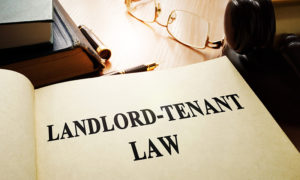Managing a rental property is not always an easy endeavor, especially if you’ve never done it before. Familiarize yourself with the steps on how to become a landlord, and you’ll be well on your way.
A Guide on How to Become a Landlord
There are many things that can trigger your interest in becoming a landlord. Perhaps you own an unoccupied property and are in need of extra money. Maybe you’re looking for your next investment opportunity. Or, perhaps you’re just genuinely curious about the requirements to be a landlord.
Is owning rental property worth it? Being a landlord often involves a lot of time and work. But, when done correctly, you can get a sizable return on your investment. Do landlords make a profit? How much money do landlords make a year? The national average landlord salary currently sits at $73,659 a year, which translates to about $35 an hour.
While you can certainly learn on the job, it’s better to go into your landlord duties already knowing what to do. This will minimize the risk of error, which can sometimes be costly or troublesome to remedy. Here are the steps on how to be a landlord:
1. Do Your Research
How do I start being a landlord? With research, of course. Before you can start renting to tenants, you first need a property to rent. That means researching the right locations and price points.
Your main goal here is to earn rental property income, and you can’t do that if you make a bad investment. Make sure the rent you charge can cover the monthly expenses associated with the rental property.
 2. Familiarize Yourself With the Law
2. Familiarize Yourself With the Law
A first-time landlord should get acquainted with the many laws that affect landlords, tenants, and rental properties. This includes the federal Fair Housing Act and the Landlord-Tenant Law. States also usually have their own fair housing and landlord-tenant laws, so you should familiarize yourself with those as well. Making sure you comply with these laws can protect you from the risk of legal liability.
3. Invest in a Property
Buying a rental property takes time and consideration. After settling on a location, you should make sure the property you end up choosing fits your budget. It’s unwise to invest in a rental property you can’t afford. Another critical criterion is the condition of the property. Although you can probably get them for cheap, a property that’s in need of major repairs will only cost you more money in the long run.
After buying your rental property, you should make time to get it move-in ready. That means applying a fresh coat of paint, doing some cleaning, and making any necessary repairs. You should also see to it that the property complies with health and safety codes.
Test out smoke and carbon monoxide detectors. Doors and windows should lock and unlock properly. Lastly, have a professional check the electrical system.
4. Manage Your Financials
An essential part of any rental property business plan is financial management. Make sure to do correct accounting and bookkeeping right from the get-go. This involves keeping accurate records of all financial transactions as well as any supporting documents (such as receipts).
Proper accounting and bookkeeping will help establish a strong foundation for your financial system and avoid potential problems in the future. It will also allow you to create financial statements easily and make tax season a breeze.
5. Set the Right Rental Rate
You want to strike the right balance when it comes to determining your rental rate. Charging too high a rent can scare away potential tenants, while too low might earn you a loss.
How much can I charge to rent my house? You start by looking at the cost of rent for properties in your surrounding area. Compare your rental property type (single-family home, one-bedroom apartment, etc.) with similar types in your location. Once you have a rough figure in mind, make sure it covers the cost of your monthly rental property expenses.
6. Advertise Your Rental Property
Now that your property is move-in ready and you know how much rent to charge, it’s time to market your listing. The most popular way to advertise rental properties is through online mediums. This includes rental property websites like Zillow or Apartments.com as well as social media. Be wary of sites like Craigslist, though, as those aren’t generally reliable.
When creating your listing, make sure to include flattering, high-quality photos of your rental property. You should also include all pertinent details, such as the number of bedrooms and bathrooms, specific amenities, and any special rules you may have (such as no pets allowed).
7. Buy the Necessary Insurance
Insurance will protect your rental property from liability such as accidents or natural disasters. There are many types of insurance available depending on the provider. But, you should typically get coverage for your property’s structure and loss of rental income in case of repairs. It’s also a good idea to obtain a policy that covers any medical or legal costs associated with your rental.
It’s worth noting that landlord insurance is separate from renters insurance, which covers the tenant’s belongings. Therefore, you should require renters insurance from your tenants to avoid any problems.
8. Screen Tenants
If you market your property well, you’ll soon have a flood of applications pouring in. But, how do you filter through a sea of interested tenants and narrow down your options? Simple — screen them.
Good tenants aren’t easy to find, but screening applicants certainly helps. Make sure to conduct checks of their background, credit score, criminal history, employment status/history, and rental history. You should also ask applicants for references. The tenant screening process is quite demanding and time-consuming. Luckily, there are services that can do them for you.
9. Draft Your Lease
Your lease needs to be detailed and specific. Avoid basic, barebones leases that could work for anyone — those aren’t going to protect you enough. Consider how you feel about pets, parking, smoking, etc. on your property. How will you set the rules? Spell everything out, and make sure your attorney takes a look at any additions you make before you have the tenant sign.
And, remember that depending on where you live, there may be specific landlord-tenant laws that you have to follow and include in your lease. Then, go through the lease with your new tenant. Explain each section, answering any questions they might have. This protects you in case there are any problems or complaints that come up.
 10. Stay on Top of Maintenance
10. Stay on Top of Maintenance
Maintaining your rental property is a vital part of your duties as a landlord. This helps you provide a habitable home for your tenants and keep them satisfied. Make sure to conduct regular inspections of your property to see what needs maintenance or repairs. Preventive maintenance also involves scheduling monthly pest control services, replacing HVAC filters, and cleaning the gutters.
Additional Tips on How to Become a Landlord
How do I become a successful landlord? Here are some tips on how to manage a rental property with great success:
- Use a Rental Application. A rental application form will allow you to collect all the necessary information from applicants. It also allows you to ask important questions such as, “Why are you moving?” and “Have you ever been evicted?
- Avoid Scams. Online scams are a very real thing, so protect any pictures and information you share in listings. Watermark your images by putting your phone number on them to prevent others from stealing them and making a fake listing to scam potential renters. And, avoid posting your exact address.
- Communicate by Mail. Put everything in writing to avoid confusion and always have a record of what you said. Email might be okay as a legal form of communication, depending on your state, but mail definitely is. If you want to be sure you’re communicating in a way that is official by law, send any notices or reminders by mail.
- Collect Rent Online. Late rent payments are one of the most common problems landlords face. Make it easy for tenants to settle (and for you to collect) rent by allowing online payments.
- Offer Renewal Incentives. If you want to keep a good tenant, make it worth their while to renew their lease. Offer incentives such as discounts or free upgrades.
- Set Up a Contingency Fund. A good landlord always sets aside money for contingencies. This way, you won’t be strapped for cash when an unexpected expense comes up.
Do You Need Professional Property Management Services?
You might think they’re one and the same, but being a landlord and being a property manager are two distinct things.
What is a landlord? A landlord is someone who rents a property (usually a property they own) to a tenant. Being a landlord comes with many duties, such as advertising the rental property, screening tenants, setting and collecting rent, and maintaining the rental property.
In comparison, a property manager is someone who professionally manages rental properties. Property managers usually perform the same duties as a landlord for a fee. The requirements for how to become a property manager, though, are different from those of a landlord. The former typically needs a license, while the latter does not.
If you’re a landlord, it’s best to seek the help of a property manager or management company if you:
- Live far away from your rental property;
- Lack the time or skills to manage your rental property; and/or
- Aren’t interested in hands-on rental management.
Is Being a Landlord Easy?
Being a landlord is a full-time job. It’s not always an easy path to tread, but when done properly, it can be very rewarding and fruitful. Hopefully, these steps and tips on how to become a landlord can help you get started on the right foot.
If you prefer to seek professional services, though, you can always find them on Rental Choice. Use our online directory to look for the best property management companies in your area.
RELATED ARTICLES:
- The Pros And Cons Of Tenant Screening Services
- A Guide For Landlords On How To Make A Rental Contract
- Everything You Should Know About Rent Collecting




 Company
Company